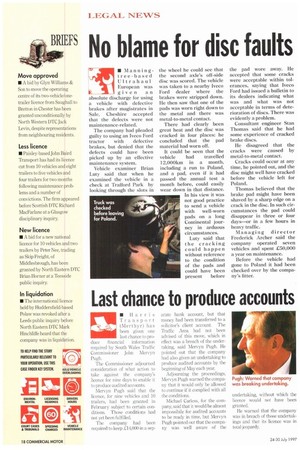BRIE" No blame for disc faults • Manningtree-basecl Ultrahaul European
Page 20

If you've noticed an error in this article please click here to report it so we can fix it.
was given an absolute discharge for using a vehicle with defective brakes after magistrates in Sale, Cheshire accepted that the defects were not maintenance-related.
The company had pleaded guilty to using an Iveco Ford tractor with defective brakes, but denied that the defects could have been picked up by an effective maintenance system.
Vehicle examiner Brian Luty said that when he examined the vehicle in a check at Trafford Park by looking through the slots in the wheel he could see that the second axle's off-side disc was scored. The vehicle was taken to a nearby Iveco Ford dealer where the brakes were stripped down. He then saw that one of the pads was worn right down to the metal and there was metal-to-metal contact.
There had clearly been great heat and the disc was cracked in four places: he concluded that the pad material had worn off.
It could be seen that the vehicle had travelled 12,000km in a month, including a run to Poland, and a pad, even if it had passed the annual test a month before, could easily wear down in that distance. In his view it was not good practice to send a vehicle with well-worn pads on a long Continental journey in arduous circumstances.
Luty said that the cracking could happen without reference to the condition of the pads and could have been present before the pad wore away. He accepted that some cracks were acceptable within tolerances, saying that Iveco Ford had issued a bulletin to its dealers indicating what was and what was not acceptable in terms of deterioration of discs. There was evidently a problem.
Consultant engineer Stan Thomas said that he had some experience of cracked brake discs.
He disagreed that the cracks were caused by metal-to-metal contact.
Cracks could occur at any time, he pointed out, and the disc might well have cracked before the vehicle left for Poland.
Thomas believed that the brake pad might have been shaved by a sharp edge on a crack in the disc. In such circumstances the pad could disappear in three or four days—or in a few hours in heavy traffic.
Managing director Frederick Archer said the company operated seven vehicles and spent £50,000 a year on maintenance.
Before the vehicle had gone to Poland it had been checked over by the company's fitter.








































































































